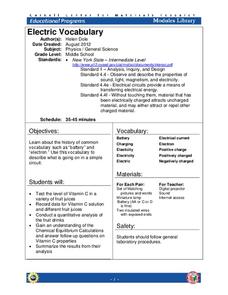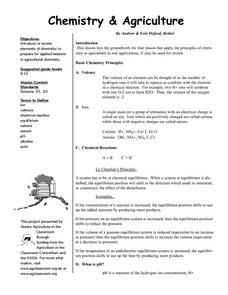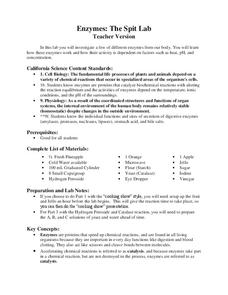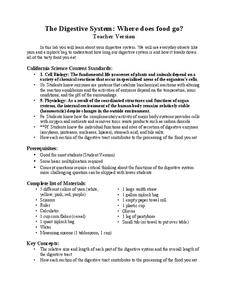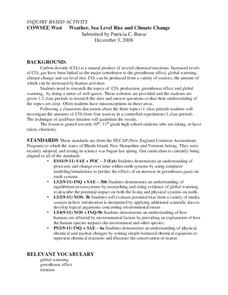Curated OER
Rocking the Boat
Students work together to discover the concepts of stability and equilibrium. They examine how equilibrium is related to an item's center of mass. They create their own action scene in a literacy activity.
Cornell University
Electric Vocabulary
Practice electric vocabulary using multiple methods. Learners begin by watching a video that explains vocabulary related to electric currents. They match vocabulary cards to practice and then create an electric circuit. Using the...
Curated OER
Basic Chemistry Principles
High schoolers use the basic principles of Chemistry to determine pH levels. Elements of the Periodic Table are also included in this lesson.
Virginia Department of Education
Soap, Slime, and Creative Chromatography
Do you think chromatography paper suffers from separation anxiety? Young chemists make soap, slime, silly putty, and experiment with chromatography in this lesson. The material includes clear instructions for each experiment along with...
Chicago Botanic Garden
Carbon, Greenhouse Gases, and Climate
Climate models mathematically represent the interactions of the atmosphere, oceans, land, sun, surface, and ice. Part two in the series of four lessons looks at the role greenhouse gases play in keeping Earth warm and has participants...
Chymist
The Solubility of a Salt in Water at Various Temperatures
An educational lesson allows young chemists to test the solubility of different types of salt at various temperatures. Groups create a graph using data from unsaturated, saturated, and supersaturated solutions.
Curated OER
Salt Bridges
In this chemistry worksheet, young scholars examine the salt bridge in order to apply in the laboratory setting. The sheet includes in depth background information.
LABScI
Enzymes: The Spit Lab
Enzymes in our bodies each have a job to do. Learn the factors that affect the activity of some enzymes using the third activity of an informative 12-part biology series. A three-part laboratory activity asks teams to investigate how...
Curated OER
The Effects of Temperature on Rate
Learners create predictions on what they believe happen to reaction rates when temperature is raised. They use hot, cold, and room temperature water for this experiment and observe the differences. They graph their observations and...
Chicago Botanic Garden
Greenhouse Gas Emissions — Natural and Human Causes
What impact do humans have on greenhouse gas emissions? What are the natural causes of these gasses? Thanks to the carbon cycle, carbon dioxide eats away at the earth's atmosphere with the intensified help of humans. Young scientists...
Chicago Botanic Garden
Calculating Your Carbon Footprint
Unplugging from technology for one day per week will decrease your carbon footprint—are you up to the challenge? Part two in a series of three allows individuals to explore their personal carbon footprints. By first taking a quiz at home...
Chicago Botanic Garden
Calculating Your Ecological Footprint
You can lower your ecological footprint by recycling! Lesson four in this series of five has individuals, through the use of a computer, calculate their ecological footprints. Through discussions and analysis they determine how many...
LABScI
The Digestive System: Where Does Food Go?
Would you believe that your digestive system stretches to five times your height?! Help your pupils to understand this relationship as they work through the laboratory exercise. The first instructional activity of a 12-part series is a...
Curated OER
Marine Protected Areas (MPA)
Ninth graders explain the purpose of MPA's. In this biology lesson, 9th graders identify MPA's in Southern California. They simulate coastal sampling using candy from two buckets. Students analyze their results and share it with the class.
Curated OER
Daniell Cell
High schoolers explain how Daniell cells work. In this electrochemistry lesson plan, students conduct a variety of experiments to explore the different types of cells. They create a model of Daniell cell.
Curated OER
Phytoplankton and Ocean Color
Fifth graders identify function of phytoplankton in the biospere by conducting experiments and simulations and reading for information. They detect the presence of phytoplankton in bodies of water by examining ocean in satellite images...
Curated OER
Hot Cans and Cold Cans
Students investigate the physics of heating and cooling through conduction, convection, and radiation. Working in groups, they determine the best way to cool a can of water and warm a can of water. Temperature is taken at five minute...
Curated OER
AP Chemistry: Acid-Base Worksheet
In this acid-base worksheet, students solve multiple problems related to reactions of acids and bases. They determine pH of solutions, they find conjugate acids and bases, they calculate concentrations of acids and bases and they write...
Curated OER
Chemistry in Action
In this chemistry in action worksheet, students read about sulphuric acid, the use of metals, the production of titanium and the detection of chemical elements and compounds. Students are given 8 statements about what they should know...
Curated OER
Climate Change: Is there a Controversy
Learners explore climate changes. In this climate changes activity, students research what causes changes. Learners search the Internet, summarize reports they find and create a poster with the information.
Curated OER
Weather, Sea Level Rise and Climate Change
Students compare the carbon dioxide content of four different samples. In this chemistry lesson, students research the causes of global warming. They explain how humans contribute to rising global temperature.
Curated OER
Carbon Dioxide
Learners conduct a series of experiments to explore carbon dioxide properties. In this chemistry lesson, students explain the production and uses of this gas. They measure its amount in soda and waste product of yeast.
Curated OER
Teaching about the Chemistry of Oxygen Solubility
Students explore solubility of gases in water, Henry's Law, LeChatelier's Principal, and supersaturation of gases in water.
Curated OER
Collisions Drive Reactions
In this reactions worksheet, high schoolers determine what must take place in order for a reaction to occur. Students complete 6 short answer questions.
Other popular searches
- Chemical Equilibrium and Ph
- Incs Chemical Equilibrium
- Chemical Equilibrium History
- Igcse Chemical Equilibrium



